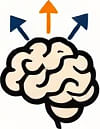Practical Drills for Building Self-Efficacy
 by Thaddeus Blanda
by Thaddeus Blanda
Discover effective drills to strengthen self-efficacy and foster a high-agency mindset. This guide offers actionable strategies for ambitious professionals seeking personal growth, helping you take charge of your decisions and outcomes through consistent practice and reflection.

Self-efficacy forms the core of a high-agency mindset, enabling individuals to influence their paths and achieve goals with confidence. This approach emphasizes taking direct action in daily life, turning intentions into results.
What is Self-Efficacy?
Self-efficacy refers to the belief in one's ability to succeed in specific situations. For those pursuing personal development, it acts as a foundation for resilience and progress. Building self-efficacy requires consistent effort and targeted exercises that promote growth.
In practice, this means engaging in activities that challenge limits and reinforce capabilities. Many ambitious individuals find that enhancing this trait leads to better performance in professional settings and everyday challenges.
Key Drills for Development
To build a high-agency mindset, incorporate these practical drills into your routine. Each one focuses on actionable steps that encourage self-reflection and improvement.
Daily Affirmation Exercises
Start each day with simple affirmations that highlight personal strengths. For example, write down three achievements from the previous day and how they demonstrate your capabilities. This drill helps solidify belief in your potential, making it easier to face new tasks.
Over time, these affirmations create a pattern of positive reinforcement. Remember, repeating this exercise fosters a sense of control, which is essential for a high-agency mindset.
Goal-Setting Challenges
Set clear, achievable goals and break them into smaller steps. High-agency mindset thrives on this structure, as it turns abstract ambitions into concrete actions. Try a weekly challenge where you outline objectives and track progress in a journal.
This method encourages accountability and reduces overwhelm. By focusing on one goal at a time, you build momentum and see tangible results, reinforcing your ability to drive change.
Role-Playing Scenarios
Simulate difficult situations to practice responses. For instance, imagine a work presentation and rehearse it aloud, emphasizing your prepared points. Such drills prepare you for real-life pressures and enhance decision-making skills.
Engaging in these scenarios regularly builds confidence in handling uncertainty, a key aspect of personal development.
Reflection Journals
End your day by reviewing experiences and outcomes. Note what worked well and what could improve, focusing on your role in those events. This practice promotes learning from experiences and strengthens resolve.
Through consistent journaling, individuals develop a deeper awareness of their influence, supporting ongoing growth.
Strategies for Overcoming Obstacles
Everyone encounters setbacks, but a high-agency mindset involves proactive responses. Use these strategies to maintain momentum.
First, identify common barriers like procrastination or self-doubt. Then, apply targeted drills to address them. For example, create a routine that includes short breaks during tasks to sustain focus and energy.
Another strategy is seeking feedback from peers. This provides external perspectives and helps refine approaches, ensuring you stay on track with your development.
In group settings, share progress with others who are also pursuing self-improvement. This creates a supportive environment that motivates action and celebrates successes.
Integrating Drills into Daily Life
To make these drills effective, weave them into your schedule. Dedicate specific times for exercises, such as mornings for affirmations and evenings for reflection. Consistency is vital, as it transforms these practices into habits.
For professionals, adapt drills to fit work demands. Use goal-setting during planning sessions or role-playing before meetings. This integration ensures that personal development aligns with career goals, leading to holistic growth.
Tracking progress is also important. Maintain a log of your drills and note changes in confidence levels over time. Seeing improvements reinforces the value of your efforts and encourages continued practice.
The Role of Community
While individual effort drives self-efficacy, connecting with like-minded people amplifies results. Join groups focused on personal development to exchange ideas and experiences. This interaction provides inspiration and new strategies for your drills.
Through shared discussions, you gain insights that enhance your own practices, making the journey more effective and enjoyable.
Measuring Success
Evaluate your progress by setting benchmarks. For instance, track how often you achieve goals or handle challenges with ease. This measurement helps quantify gains in self-efficacy and adjusts drills as needed.
Ultimately, success in this area means feeling empowered to make choices that align with your vision. Embrace the process, as each step forward builds a stronger foundation for future endeavors.
By committing to these drills, you position yourself for lasting change. Remember, the key lies in action—start today and watch your capabilities grow.
